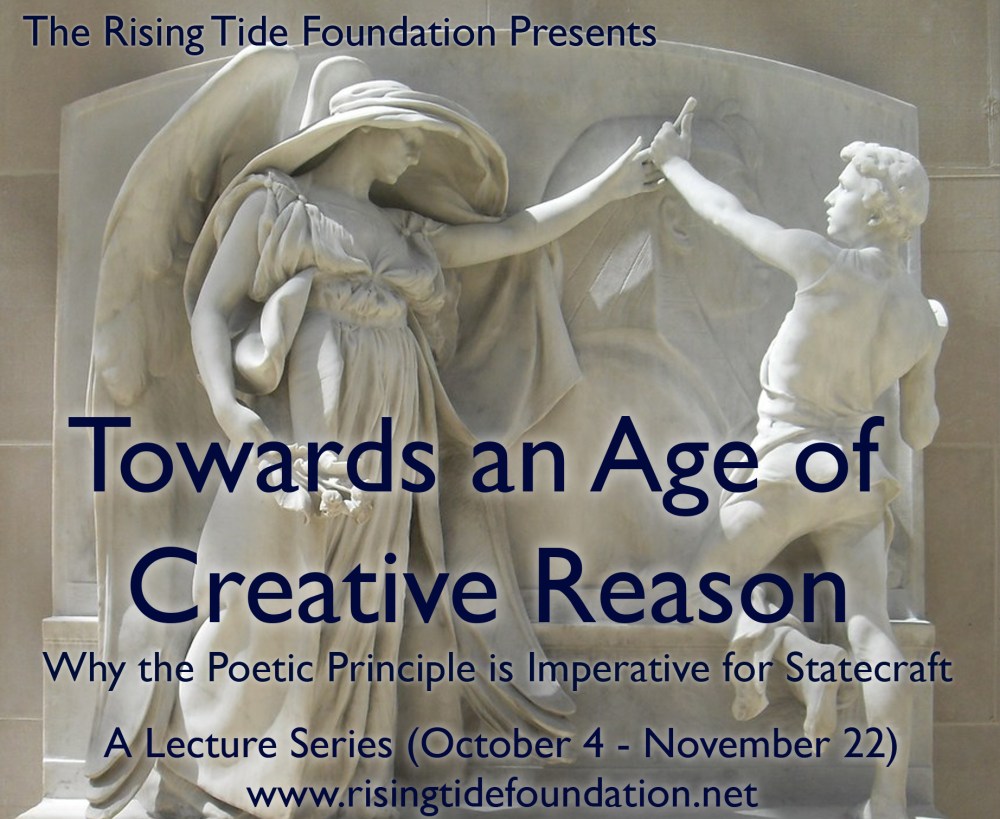
To register for these lectures, please contact info@risingtidefoundation.net
Today, perhaps more so than at any time in history, we are experiencing a divide between what is considered to be the “domain” or “confinement” of art as wholly separate from the domain of “politics.”
The irony of such a perception is its failure to recognise that the root of our political system was enjoined with the arts from its very inception.
Looking at ancient Egypt and Athens, mythos was dominant in all spheres of thought. Mythos, which pertains to anything transmitted by word of mouth, i.e. fables, legends, narratives, tales etc., would often hold within it a significant truth or meaning for the society as a whole. In other words, ideas that were pervasive in these cultures and shaped all aspects of life including its politics and sciences were shaped by mythoi, or the art of story-telling.
Homer’s great poems that are left to us today, The Iliad and The Odyssey, describe the events of the Trojan War and its immediate aftermath, events which marked the descent of Greece into a dark age. Following the Trojan War, approx. 1190 BCE, the civilization of mainland Greece collapsed, written language was lost, cities disappeared.
The Iliad and The Odyssey, written around 700 BCE heralded the reversal of the collapse, and the beginnings of Classical Greek culture.

These epic stories of Homer which had been passed down through the centuries by poet bards who had memorised entire texts, would travel all throughout Greece and recount these tales. These “stories” became a dominant cultural reference point for all of Greece and beyond, and are greatly influential to this day.
Why do you think that is? Is it purely the fancy of the imagination? Or can our mind, situated in the realm of the imagination, come to a profound discovery through mere “story-telling”?
As Shelley wrote in his “A Defense of Poetry”:
The poems of Homer and his contemporaries were the delight of infant Greece; they were the elements of that social system which is the column upon which all succeeding civilization has reposed. Homer embodied the ideal perfection of his age in human character…
One could argue, those were simpler times, in today’s calculating and information-dominated world we cannot afford such fanciful, inexact thinking within the realm of “politics”. Well I would argue that this in fact only increases the urgency of art’s reintroduction into the realm of “reality” so to speak.
For example, have you ever searched for something, stubbornly staring at a specific area you were certain you left the item, but it is not there. You then proceed to rummage through your entire house, and then upon returning to that same spot, you realise, that the item you were looking for was always there? It was in fact right in front of you, but for some inexplicable reason, you could not “see” it at the time.
Well, in short, poetry gives us that ability to “see” something that has remained hidden from us.
It is not simply a matter of “logic” or “reason” that we can compel such things to reveal themselves to us, and no matter how much effort we put into insisting with our senses that we know something to be true, even our very eyes have the ability to show us a false image.
It is through the imagination that we have access to the highest capacity for reason. [For more on this refer to the full length article here.]
Thus, Rising Tide Foundation is proud to present a lecture series that will focus on this subject of discussion.
Lecture Schedule:
Sunday, October 11 from 4-6 pm EST Paul Robeson and the Battle for the Soul of America Lecturer: Matthew Ehret, co-founder of Canadian Patriot Review and the Rising Tide Foundation
Sunday, October 18 from 4-6 pm EST The Poetic Principle in the world of the I Ching, Mankind’s Long Journey to Reason & Beauty Lecturer: Dr. Quan Le
Sunday, October 25 from 4-6 pm EST Jonathan Swift’s Cultural War in London: the Role of the Scriblerus Club Lecturer: Aaron Kalfon
Sunday, November 1 from 4-6 pm EST The Poetic Principle As a Force for Universal History Lecturer: Gerry Therrien
Sunday November 8 from 4-6 pm EST
Marlowe as Shakespeare: The Drama of Political Intelligence and the Education of a Citizenry
Lecturer: Martin Sieff
Sunday, November 15 from 4-6 pm EST The Russian Poet of Freedom: On Pushkin’s “Little Tragedies” and the Law of Nemesis Lecturer: Cynthia Chung, co-founder of the Rising Tide Foundation
Sunday, November 29 from 4-6 pm EST On Schiller’s Aesthetics Lecturer: Nicholas Jones, founder of Artists Alliance for Africa and dancer for Les Grands Ballets de Montreal
Sunday, December 6 from 4-6 pm EST Cultural Warfare and the American Revolution: Franklin, West and Morse Revisited Lecturer: Matthew Ehret, editor-in-chief of the Canadian Patriot Review and co-founder of the Rising Tide Foundation
Feature Image: Death and the Sculptor by Daniel Chester French
Make a one-time donation
Make a monthly donation
Make a yearly donation
Choose an amount
Or enter a custom amount
Your contribution is appreciated.
Your contribution is appreciated.
Your contribution is appreciated.
DonateDonate monthlyDonate yearly